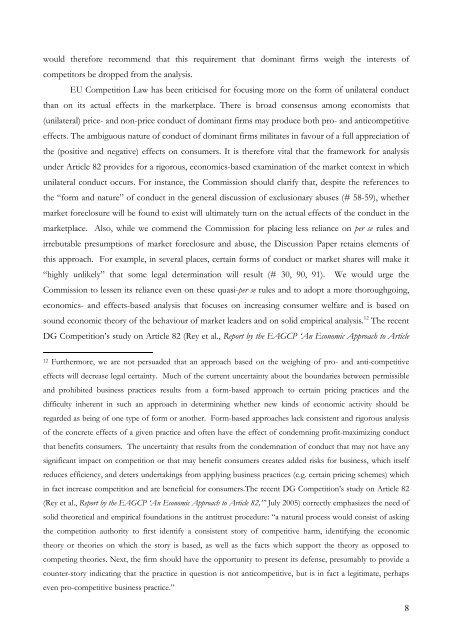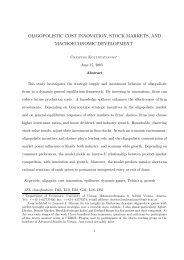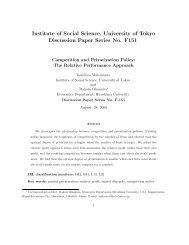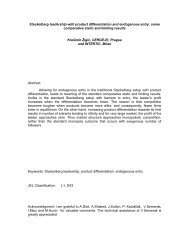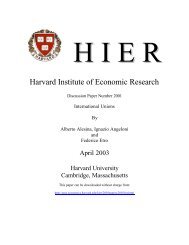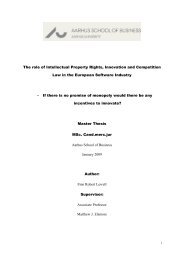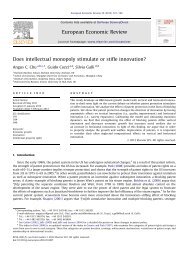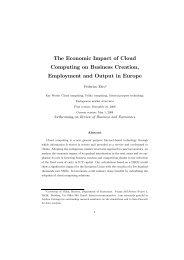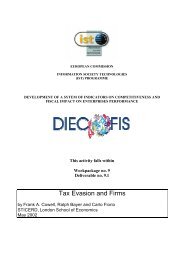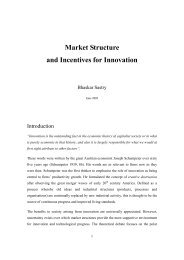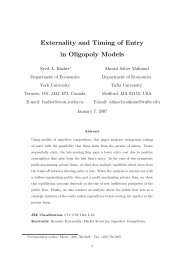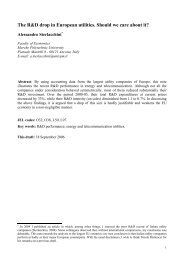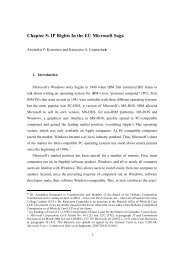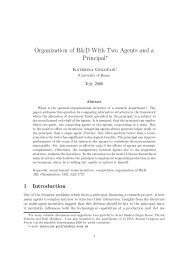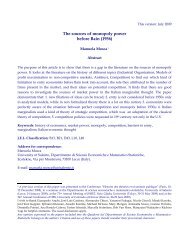The EU Approach to Abuse of Dominance - Intertic
The EU Approach to Abuse of Dominance - Intertic
The EU Approach to Abuse of Dominance - Intertic
You also want an ePaper? Increase the reach of your titles
YUMPU automatically turns print PDFs into web optimized ePapers that Google loves.
would therefore recommend that this requirement that dominant firms weigh the interests <strong>of</strong><br />
competi<strong>to</strong>rs be dropped from the analysis.<br />
<strong>EU</strong> Competition Law has been criticised for focusing more on the form <strong>of</strong> unilateral conduct<br />
than on its actual effects in the marketplace. <strong>The</strong>re is broad consensus among economists that<br />
(unilateral) price- and non-price conduct <strong>of</strong> dominant firms may produce both pro- and anticompetitive<br />
effects. <strong>The</strong> ambiguous nature <strong>of</strong> conduct <strong>of</strong> dominant firms militates in favour <strong>of</strong> a full appreciation <strong>of</strong><br />
the (positive and negative) effects on consumers. It is therefore vital that the framework for analysis<br />
under Article 82 provides for a rigorous, economics-based examination <strong>of</strong> the market context in which<br />
unilateral conduct occurs. For instance, the Commission should clarify that, despite the references <strong>to</strong><br />
the “form and nature” <strong>of</strong> conduct in the general discussion <strong>of</strong> exclusionary abuses (# 58-59), whether<br />
market foreclosure will be found <strong>to</strong> exist will ultimately turn on the actual effects <strong>of</strong> the conduct in the<br />
marketplace. Also, while we commend the Commission for placing less reliance on per se rules and<br />
irrebutable presumptions <strong>of</strong> market foreclosure and abuse, the Discussion Paper retains elements <strong>of</strong><br />
this approach. For example, in several places, certain forms <strong>of</strong> conduct or market shares will make it<br />
“highly unlikely” that some legal determination will result (# 30, 90, 91). We would urge the<br />
Commission <strong>to</strong> lessen its reliance even on these quasi-per se rules and <strong>to</strong> adopt a more thoroughgoing,<br />
economics- and effects-based analysis that focuses on increasing consumer welfare and is based on<br />
sound economic theory <strong>of</strong> the behaviour <strong>of</strong> market leaders and on solid empirical analysis. 12 <strong>The</strong> recent<br />
DG Competition’s study on Article 82 (Rey et al., Report by the EAGCP ‘An Economic <strong>Approach</strong> <strong>to</strong> Article<br />
12 Furthermore, we are not persuaded that an approach based on the weighing <strong>of</strong> pro- and anti-competitive<br />
effects will decrease legal certainty. Much <strong>of</strong> the current uncertainty about the boundaries between permissible<br />
and prohibited business practices results from a form-based approach <strong>to</strong> certain pricing practices and the<br />
difficulty inherent in such an approach in determining whether new kinds <strong>of</strong> economic activity should be<br />
regarded as being <strong>of</strong> one type <strong>of</strong> form or another. Form-based approaches lack consistent and rigorous analysis<br />
<strong>of</strong> the concrete effects <strong>of</strong> a given practice and <strong>of</strong>ten have the effect <strong>of</strong> condemning pr<strong>of</strong>it-maximizing conduct<br />
that benefits consumers. <strong>The</strong> uncertainty that results from the condemnation <strong>of</strong> conduct that may not have any<br />
significant impact on competition or that may benefit consumers creates added risks for business, which itself<br />
reduces efficiency, and deters undertakings from applying business practices (e.g. certain pricing schemes) which<br />
in fact increase competition and are beneficial for consumers.<strong>The</strong> recent DG Competition’s study on Article 82<br />
(Rey et al., Report by the EAGCP ‘An Economic <strong>Approach</strong> <strong>to</strong> Article 82,’” July 2005) correctly emphasizes the need <strong>of</strong><br />
solid theoretical and empirical foundations in the antitrust procedure: “a natural process would consist <strong>of</strong> asking<br />
the competition authority <strong>to</strong> first identify a consistent s<strong>to</strong>ry <strong>of</strong> competitive harm, identifying the economic<br />
theory or theories on which the s<strong>to</strong>ry is based, as well as the facts which support the theory as opposed <strong>to</strong><br />
competing theories. Next, the firm should have the opportunity <strong>to</strong> present its defense, presumably <strong>to</strong> provide a<br />
counter-s<strong>to</strong>ry indicating that the practice in question is not anticompetitive, but is in fact a legitimate, perhaps<br />
even pro-competitive business practice.”<br />
8


